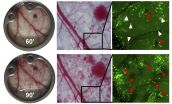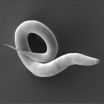Immune cell journey has bloody consequences
2015-07-13
(Press-News.org) Immune cells that creep across blood vessels trigger potentially fatal bleeding in platelet-deficient mice, according to a report published in The Journal of Experimental Medicine. If the same is true in humans, blocking the passage of these cells could prevent dangerous complications in patients undergoing transplants or chemotherapy.
Bone marrow transplantation and chemotherapy are known to deplete blood-clotting cells called platelets, resulting in potentially fatal bleeding (hemorrhage) in some patients. Previous studies showed that inflammation was required for bleeding complications to develop in these patients, but exactly what kicks off the process was unknown.
Scientists in Germany have now identified the bloody culprit as immune cells called neutrophils. Neutrophils are best known as first-responder cells that are called to sites of infection to engulf and destroy invading microbes. But this salutary function is not without consequences, as several microbe-busting products released by activated neutrophils also result in collateral damage to tissue and blood vessels.
And when platelet levels are low, the study suggests, the simple act of crawling out of blood vessels is enough for neutrophils to trigger bleeding complications in mice. When they blocked or removed proteins required for neutrophils to traverse the protective endothelial layer of blood vessels, bleeding was prevented. Similarly, in humans, UV-induced skin bleeding was worse in patients with low platelet counts, hinting at the potential therapeutic benefit of blocking neutrophils' cross-vessel journey.
INFORMATION:
Hillgruber, C., et al. 2015. J. Exp. Med. doi:10.1084/jem.20142076
About The Journal of Experimental Medicine
The Journal of Experimental Medicine (JEM) is published by The Rockefeller University Press. All editorial decisions on manuscripts submitted are made by active scientists in conjunction with our in-house scientific editors. JEM content is posted to PubMed Central, where it is available to the public for free six months after publication. Authors retain copyright of their published works and third parties may reuse the content for non-commercial purposes under a creative commons license. For more information, please visit http://www.jem.org .
[Attachments] See images for this press release:

ELSE PRESS RELEASES FROM THIS DATE:
2015-07-13
BOSTON (July 13, 2015)--Physicians in their medical residency training programs often focus on scientific reasoning and research evidence in their efforts to provide medical care. While appropriate, this focus may overshadow subtle and indirect communication that reveals important information about the patient's experience with their illness that will help the physician provide better care. A new study by researchers at Tufts University School of Medicine and Boston College presents the results of a strategy to train medical residents to reflect on interactions with patients ...
2015-07-13
James Cook University scientists have helped invent a clever technique to tell black leopards apart - a trick that may end up saving their skins.
Scientists from JCU in Australia and others have been studying the leopards on the Malay Peninsula - where almost all of the big cats are jet black.
Experts have no idea why the leopards are black and, until recently, could not tell them apart, hindering research and conservation efforts.
But researchers have now devised a simple method to solve the problem by manipulating the mechanism of automatic cameras.
"Most automatic ...
2015-07-13
Scientists have found that strains of the wheat pathogen causing severe yellow rust epidemics in Europe have their origin in the centre of diversity in the Himalayan region. This disease can have a great impact on wheat production in Europe, including organic crop production in Denmark.
Wheat is the most widely cultivated food crop in the world. However, the global production of wheat is under constant threat from devastating fungal diseases. The ever more frequent and severe large-scale epidemics caused by these fungi pose a severe threat to global food security.
Scientists ...
2015-07-13
A new study has found that cancer survivors' options for adoption may be limited by adoption agencies' policies. Published early online in CANCER, a peer-reviewed journal of the American Cancer Society, the study also indicates that a training program for oncology healthcare providers can help them provide valuable information to patients who are making decisions about fertility and adoption.
Because cancer and the therapies used to treat it can leave some patients infertile, many young cancer survivors may turn to adoption when hoping to start--or add to--a family. Adoption ...
2015-07-13
ANN ARBOR, Mich. -- Few people today would dare call President Richard Nixon a radical liberal. But 44 years ago, he proposed a health plan that went far beyond what today's Affordable Care Act includes. After the first plan failed, he did it again three years later.
And just like today's heated rhetoric from opponents of the ACA, also called "Obamacare" after the president who introduced it, Nixon's plans were met with inflamed opposition from the other party.
In a new article in the journal Pediatrics, a team from the Child Health Evaluation and Research Unit at ...
2015-07-13
This news release is available in German.
Slugs and other invertebrates provide essential public transport for small worms in the search for food, according to research published in the open access journal BMC Ecology.
Nematode worms (including Caenorhabditis elegans) are around a millimeter long and commonly found in short-lived environments, such as decomposing fruit or other rotting plant material. The worms face a high level of unpredictability in these environments as temperature and food availability fluctuate, and frequently need to move to new locations. ...
2015-07-13
Treatment could save the NHS £3.1 billion every year
More than 200,000 patients in the UK suffer with chronic wounds
Healing time can be reduced by a third
Healing times for skin ulcers and bedsores can be reduced by a third with the use of low-intensity ultrasound, scientists from the University of Sheffield and University of Bristol have found.
Researchers from the University of Sheffield's Department of Biomedical Science discovered the ultrasound transmits a vibration through the skin and wakes up cells in wounds helping to stimulate and accelerate the healing ...
2015-07-13
When two different sized galaxies smash together, the larger galaxy stops the smaller one making new stars, according to a study of more than 20,000 merging galaxies.
The research, published today, also found that when two galaxies of the same size collide, both galaxies produce stars at a much faster rate.
Astrophysicist Luke Davies, from The University of Western Australia node of the International Centre for Radio Astronomy Research (ICRAR), says our nearest major galactic neighbour, Andromeda, is hurtling on a collision course with the Milky Way at about 400,000 ...
2015-07-13
As the world's leaders gather in Addis Ababa, Ethiopia, for the Financing for Development Conference [1], a study published in The Lancet demonstrates that a new approach is needed for classifying funding that reflects the function the funding serves, rather than the specific disease or country. The study is the first in-depth assessment of how donor funding is spent on global versus country-specific functions of health [2].
The paper also presents an expanded definition of official development assistance (ODA) for health, which is used to identify important underfunded ...
2015-07-13
As experts debate the slow response to the Ebola outbreak in West Africa and call for better international coordination, a new analysis estimates that $22 billion was spent on global health aid in 2013, yet only a fifth of this went toward such global imperatives as research on diseases that disproportionally affect the poor, outbreak preparedness and global health leadership.
The analysis, by Dean Jamison, PhD, a global health economist at UC San Francisco (UCSF); Lawrence Summers, PhD, a former US Treasury Secretary now at Harvard University; and researchers at SEEK ...
LAST 30 PRESS RELEASES:
[Press-News.org] Immune cell journey has bloody consequences



